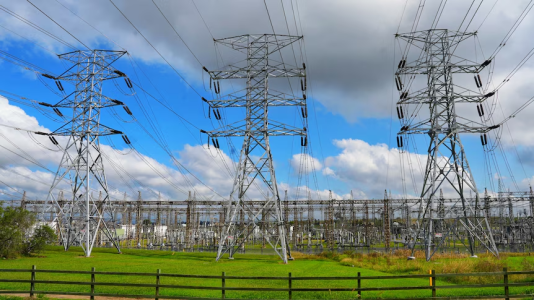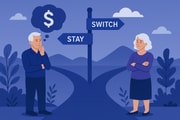Australians struggling to pay energy bills face 'major inconsistencies' in retailer responses
By
ABC News
- Replies 0
Energy customers struggling to keep up with their bills face "major inconsistencies" in how retailers respond, leaving many missing out on support, a survey of financial counsellors has found.
That's despite formal hardship frameworks being a legal requirement for energy retailers.
An Australia-wide survey of 400 financial counsellors, who work on behalf of consumers facing financial difficulty, has revealed inconsistent practices by retailers.
Key failings include a lack of proactive support, burdensome eligibility checks for assistance schemes, inflexible repayment plans and misused disconnection processes.
"It's a wake-up call for regulators and industry and governments to think about the impact energy prices and the quality of energy hardship support has on customers," said Zyl Hovenga-Wauchope, the chief executive of Financial Counselling Victoria, which organised the survey.
"It means we have a system where people experiencing hardship have a very low chance of getting a good level of support unless they are with one of the few high-performing retailers."
Western Australia's Synergy was the top performer, while French-owned ENGIE performed poorly.
"ENGIE is a strong example of poor performance across a range of factors," Mr Hovenga-Wauchope said.
"Poor communication, poor understanding of what hardship is, poor engagement with a person experiencing hardship and unrealistic options offered."
Counsellors rated the performance of retailers on a 10-point scale. A score was established by taking the percentage of high ratings and subtracting the percentage of low ratings, before the retailers were ranked by score.
The major reasons the survey respondents gave for rating retailers poorly included rejection of hardship arrangements and inflexibility, and difficult-to-access schemes.

Sarah Duane, a financial counsellor working in the Western suburbs of Melbourne, has seen firsthand the varying responses of retailers to energy customers.
She described one of the worst examples she had seen, involving a small energy company refusing to engage with counsellors on behalf of a customer, and instead continuing to "contact the traumatised client directly with demands for payment, when the client had already been evicted from her home and was living in her car".
The case was only resolved and the debt waived after a complaint to the Energy and Water Ombudsman in Victoria.
However, Ms Duane has also encountered instances of hardship processes working well for people experiencing family violence.
"Some retailers will respond empathetically and provide very reasonable payment plans, and in some cases, debt waivers — without requiring excessive evidence of their hardship," she said.
In the survey, the primary reasons given by counsellors for higher ratings included empathy and flexibility shown towards customers experiencing difficulty, as well as a positive experience working with the hardship teams.
Despite many customers reporting financial stress when it comes to power prices, a far smaller portion have access to official hardship measures.
"About 1 to 1.5 per cent of customers generally fall into the definition of hardship," Louisa Kinnear, chief executive of the Australian Energy Council, which represents retailers, told ABC News.
Last month, the Australian Energy Regulator released its default market offer, which limits what retailers can charge customers, which could see prices lift anywhere from 0.5 per cent to 9.7 per cent, depending on where users are located.
While the federal government's energy bill relief has been extended until the end of the year, Ms Kinnear said it will be an adjustment for customers as it rolls off.
"We wouldn't necessarily expect a significant increase in hardship numbers, but that's certainly something that retailers monitor and that we're very aware of.
"We need to make sure that communications with customers at the time that the relief does come off are clear and customers understand the impacts of that."
Only 12 per cent of financial counsellors rated energy companies as "excellent" at responding to hardship, compared to 36 per cent for water providers and 31 per cent for banks.
"The banking sector has done a lot of work in partnership with regulators to develop minimum standards and expectations," Mr Hovenga-Wauchope said.
"We're looking at our friends in banking and water … what they're doing well and where we can learn from them," Ms Kinnear said.
Customers who have issues with the way their retailer responds can contact the energy ombudsman scheme in their state or territory.
Financial counsellor Ms Duane also noted that people experiencing issues paying energy bills could be facing financial hardship more broadly.
"I recommend they call the National Debt Helpline on 1800 007 007."
"Different state regulators have different requirements of what hardship looks like," Financial Counselling Victoria's Mr Hovenga-Wauchope noted, saying the complex regulatory environment complicated the situation for consumers and retailers.
"There must be more consistent national standards of hardship, so that no matter where you are, you should be able to contact your energy retailer and get good quality support to navigate that period of hardship in your life."
The Australian Energy Council's Ms Kinnear argued that in some cases, state-based regulations, particularly around the language staff must use when communicating with customers, meant the assistance offered couldn't be well tailored to individual needs.
"It can actually be counterproductive for those experiencing hardship. The scripting that's required, based on the regulations on the East Coast, often is difficult for customers in hardship to understand," she said.
"We've certainly been engaging with regulators and consumer groups around how we can actually improve those regulations so that they actually help customers rather than hinder them.
The report called for retailers to do more to identify customers at risk of financial hardship by using the data available to them, as well as improve training.
"Retailers should train their staff in trauma-informed and culturally safe practices, proactively apply concessions and grants, offer flexible payment plans, and provide tailored energy efficiency advice," it recommended.
It reiterated that disconnections should be a "genuine last resort", which Ms Kinnear agreed should already be the case.
"Certainly, I think we can look at ways to ensure more consistency about how retailers approach disconnection. But my experience is that the majority of retailers don't look to disconnection until there's basically no engagement from the customer."
By business reporters Emily Stewart and Stephanie Chalmers
That's despite formal hardship frameworks being a legal requirement for energy retailers.
An Australia-wide survey of 400 financial counsellors, who work on behalf of consumers facing financial difficulty, has revealed inconsistent practices by retailers.
Key failings include a lack of proactive support, burdensome eligibility checks for assistance schemes, inflexible repayment plans and misused disconnection processes.
"It's a wake-up call for regulators and industry and governments to think about the impact energy prices and the quality of energy hardship support has on customers," said Zyl Hovenga-Wauchope, the chief executive of Financial Counselling Victoria, which organised the survey.
"It means we have a system where people experiencing hardship have a very low chance of getting a good level of support unless they are with one of the few high-performing retailers."
ENGIE ranked worst while WA retailers top the list
The report, which received input from financial counselling peak associations around the country, scored each energy retailer, and has ranked them from best to worst.Western Australia's Synergy was the top performer, while French-owned ENGIE performed poorly.
"ENGIE is a strong example of poor performance across a range of factors," Mr Hovenga-Wauchope said.
"Poor communication, poor understanding of what hardship is, poor engagement with a person experiencing hardship and unrealistic options offered."
Counsellors rated the performance of retailers on a 10-point scale. A score was established by taking the percentage of high ratings and subtracting the percentage of low ratings, before the retailers were ranked by score.
The major reasons the survey respondents gave for rating retailers poorly included rejection of hardship arrangements and inflexibility, and difficult-to-access schemes.

Financial counsellors have weighed in on how energy retailers handle customers experiencing financial hardship. (ABC News: Margaret Burin)
She described one of the worst examples she had seen, involving a small energy company refusing to engage with counsellors on behalf of a customer, and instead continuing to "contact the traumatised client directly with demands for payment, when the client had already been evicted from her home and was living in her car".
The case was only resolved and the debt waived after a complaint to the Energy and Water Ombudsman in Victoria.
However, Ms Duane has also encountered instances of hardship processes working well for people experiencing family violence.
"Some retailers will respond empathetically and provide very reasonable payment plans, and in some cases, debt waivers — without requiring excessive evidence of their hardship," she said.
In the survey, the primary reasons given by counsellors for higher ratings included empathy and flexibility shown towards customers experiencing difficulty, as well as a positive experience working with the hardship teams.
Official hardship levels low despite 40pc feeling bill pain
It comes at a time when around 40 per cent of Australians are finding it difficult to pay their home energy bill, according to data analysed by advocacy body Energy Consumers Australia.Despite many customers reporting financial stress when it comes to power prices, a far smaller portion have access to official hardship measures.
"About 1 to 1.5 per cent of customers generally fall into the definition of hardship," Louisa Kinnear, chief executive of the Australian Energy Council, which represents retailers, told ABC News.
Last month, the Australian Energy Regulator released its default market offer, which limits what retailers can charge customers, which could see prices lift anywhere from 0.5 per cent to 9.7 per cent, depending on where users are located.
While the federal government's energy bill relief has been extended until the end of the year, Ms Kinnear said it will be an adjustment for customers as it rolls off.
"We wouldn't necessarily expect a significant increase in hardship numbers, but that's certainly something that retailers monitor and that we're very aware of.
"We need to make sure that communications with customers at the time that the relief does come off are clear and customers understand the impacts of that."
Water, banking sectors respond to financial stress better: survey
The survey found the energy industry performs worse in responding to financial hardship compared to other sectors.Only 12 per cent of financial counsellors rated energy companies as "excellent" at responding to hardship, compared to 36 per cent for water providers and 31 per cent for banks.
"The banking sector has done a lot of work in partnership with regulators to develop minimum standards and expectations," Mr Hovenga-Wauchope said.
"We're looking at our friends in banking and water … what they're doing well and where we can learn from them," Ms Kinnear said.
Customers who have issues with the way their retailer responds can contact the energy ombudsman scheme in their state or territory.
Financial counsellor Ms Duane also noted that people experiencing issues paying energy bills could be facing financial hardship more broadly.
"I recommend they call the National Debt Helpline on 1800 007 007."
Counsellors call for national approach
Consumer advocates say there must be reforms in the energy sector to better protect customers."Different state regulators have different requirements of what hardship looks like," Financial Counselling Victoria's Mr Hovenga-Wauchope noted, saying the complex regulatory environment complicated the situation for consumers and retailers.
"There must be more consistent national standards of hardship, so that no matter where you are, you should be able to contact your energy retailer and get good quality support to navigate that period of hardship in your life."
The Australian Energy Council's Ms Kinnear argued that in some cases, state-based regulations, particularly around the language staff must use when communicating with customers, meant the assistance offered couldn't be well tailored to individual needs.
"It can actually be counterproductive for those experiencing hardship. The scripting that's required, based on the regulations on the East Coast, often is difficult for customers in hardship to understand," she said.
"We've certainly been engaging with regulators and consumer groups around how we can actually improve those regulations so that they actually help customers rather than hinder them.
The report called for retailers to do more to identify customers at risk of financial hardship by using the data available to them, as well as improve training.
"Retailers should train their staff in trauma-informed and culturally safe practices, proactively apply concessions and grants, offer flexible payment plans, and provide tailored energy efficiency advice," it recommended.
It reiterated that disconnections should be a "genuine last resort", which Ms Kinnear agreed should already be the case.
"Certainly, I think we can look at ways to ensure more consistency about how retailers approach disconnection. But my experience is that the majority of retailers don't look to disconnection until there's basically no engagement from the customer."
By business reporters Emily Stewart and Stephanie Chalmers








